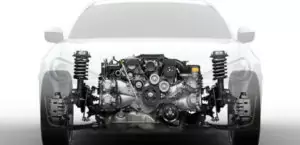The 2.0-liter turbo engine VW CHHA or Golf 7 GTI 2.0 TSI was produced from 2013 to 2018 and was installed on a number of charged models of the German concern such as Golf GTI or Octavia RS. There was a separate version of such a motor for the all-wheel drive Audi TT with the CHHC index.
The EA888 gen3 series includes: CJSA, CJSB, CJEB, CHHA, CHHB, CXDA, CNCD, CJXC.
Specifications
| Production years | 2013-2018 |
| Displacement, cc | 1984 |
| Fuel system | FSI + MPI |
| Power output, hp | 230 |
| Torque output, Nm | 350 |
| Cylinder block | cast iron R4 |
| Block head | aluminum 16v |
| Cylinder bore, mm | 82.5 |
| Piston stroke, mm | 92.8 |
| Compression ratio | 9.6 |
| Features | AVS on the exhaust |
| Hydraulic lifters | yes |
| Timing drive | chain |
| Phase regulator | on both shafts |
| Turbocharging | IHI IS20 |
| Recommended engine oil | 0W-20 |
| Engine oil capacity, liter | 5.7 |
| Fuel type | petrol |
| Euro standards | EURO 6 |
| Fuel consumption, L/100 km (for VW Golf 7 GTI 2017) — city — highway — combined |
8.1 5.3 6.4 |
| Engine lifespan, km | ~230 000 |
| Weight, kg | 140 |
The engine was installed on:
- Skoda Octavia 3 (5E) in 2015 – 2018;
- Volkswagen Golf 7 (5G) in 2013 – 2018.
Disadvantages of the VW CHHA engine
- The main problems of the motor are associated with malfunctions of the adjustable oil pump;
- Due to a strong drop in lubricant pressure in the engine, the liners can turn;
- After 100,000 km, the timing chain often needs to be replaced here, and sometimes the phase shifters;
- The boost pressure regulator V465 needs to be adapted every 50,000 km;
- The plastic housing of the water pump often cracks and leaks from high temperatures.






